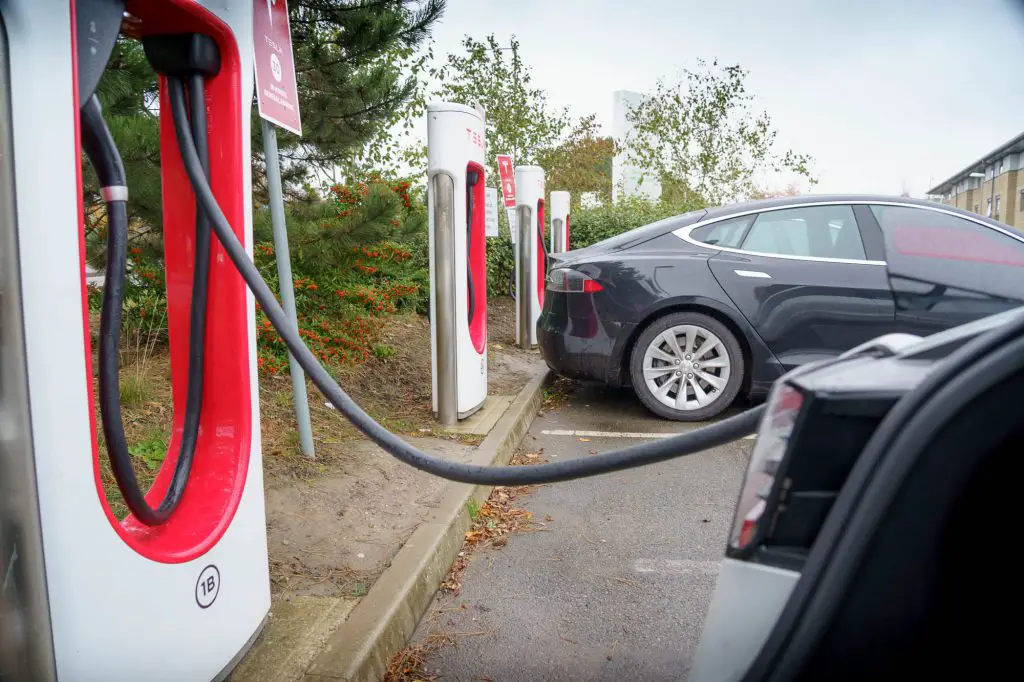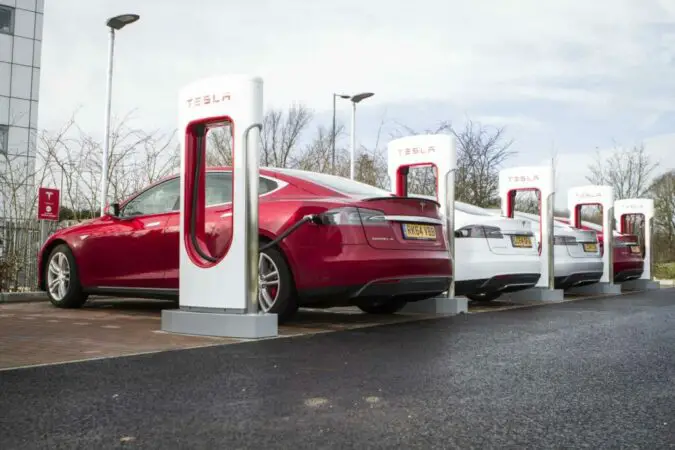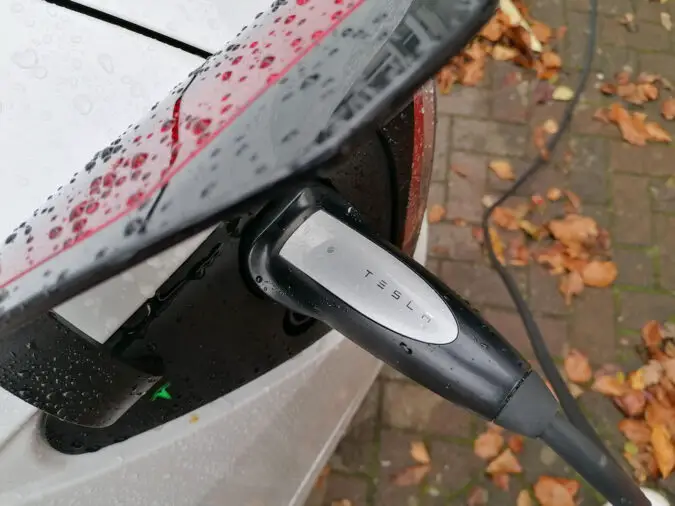Have you ever wondered what does range mean in a car? Well, if this is the case and you find yourself in a situation like this, then you are at the right place because there will be quite a lot to cover on this topic and we will elaborate on everything you need to know.
- What Range Means
- How It Is Determined?
- MPG In Cars?
- EV Average Range
- Gas Car Average Range
- Gas VS Electric
- Conclusion
- F.A.Q
Doing the proper research online is always a great idea. Especially when we are talking about car stuff in general. Cars are really complex pieces of machinery with tens of thousands of parts and also a lot of features that need proper elaboration.
Like in our case with the range. The word range is getting popular nowadays with all that EV craze since most EVs do not rely on MPG but rely more on the range to determine the maximum distance that a vehicle can travel with a certain charge of battery. But you shouldn’t worry because we are going to cover everything you need to know.
First, we are going to learn what does range mean in a car and how range is determined. Then we will also cover MPG and what it means. After that, we will cover the average range of electric vehicles and their pros and cons. We will also do the same thing with gas-powered vehicles and then determine which of them is the way to go. So, if you want to learn more, follow along.
What Does Range Mean In A Car
So, what does range mean in a car? Well, the answer to this question deserves an elaborate answer.
The fuel range means in simple words how many miles you have left with a certain amount of gas or battery charge on your vehicle. Depending on whether you drive a gas-powered vehicle or an EV.
The word range was not that popularized till recently when electric cars or EVs were introduced. Back in the good old days, there was no such thing as range and is still none when it comes to gas-powered cars. So, the term range, you will most likely find in EVs. Why is this the case?
Well, in gas-powered cars we measure fuel economy in MPG. Which are miles per gallon. So, in the EV world, there isn’t such a thing as gasoline and gallons. So, measuring the distance that a vehicle can travel on a full charge in MPG is kinda unpractical.
This is why the term range was introduced when it comes to electric vehicles. Even though, there are also gas-powered vehicles that write the range on the cluster as well.
Usually, these are more modern cars that implement a computer that measures the average range for the vehicle. I personally have this feature in my gas-powered car that gives me the estimated range.
But from personal experience, I can tell you that in gas-powered cars, the range meter is not particularly precise. It can tell you that you have 150 miles left and after 50 miles then you are running on empty. So, you can’t really rely on this measurement in gas-powered cars. We learned what does range mean in a car, now let’s see how it is determined.
How Range Is Determined In A Car
Now since we learned what does range mean in a car and learned that range is basically the mileage that you have left on the specific charge or gas tank level. We think that now it is time to learn how range is determined in a vehicle. So, how the range is determined in a car?
Let’s see first how range is determined in gas-powered engines. When it comes to this aspect many factors are taken into question.
Namely, the PCM is constantly monitoring the gas level inside of the gas tank, and also monitors the speed of the car and the throttle input from the driver.
The computer is doing all these calculations and then it delivers the range number. But even though everything is done and calculated by the computer. Estimating a range in a gas-powered engine is kind of tricky because conditions are constantly changing and fuel consumption changes based on whether you drive uphill, drive fast or go to the redline.
So, sometimes you can have a range of 150 miles and if you drive too aggressively, the range will drop to 50 miles in a couple of minutes. This is why I wouldn’t rely much on it for planning trips.
When it comes to electric cars, the situation is kinda different. It is the same as you are using your cell phone. If you play games and push them hard, the battery will deplete much sooner.
If you drive conscientiously and respect the road signs. Then you can expect the estimated range to be quite correct. So, if it says that the estimated range is 200 miles, then you will definitely get the 200 miles of range. So, on EVs, the range number is quite more precise.
Meaning Of MPG In Cars
Another topic that we would want to cover since we learned what does range mean in a car is the meaning of MPG.
A ton of people confuse MPG with range. And frankly, there isn’t much comparison between the two. So, you shouldn’t be so confused about these measurements.
Range as we mentioned is pre-calculated mileage that a vehicle can travel with that amount of fuel or electric charge.
While MPG or miles per gallon is a term where you calculate the fuel efficiency of a vehicle. So, these are two completely different topics.
Every car has an EPA MPG rating. EPA as you all know is a government agency that tests vehicles and determines their MPG, also known as miles per gallon.
These vehicles are tested in certain conditions that simulate driving in the city, driving on the highway, and also the combined fuel economy.
According to many, these official numbers are too optimistic and do not give you the exact image of the fuel economy of a vehicle.
So, when it comes to the exact MPG number based on the driving style that you have, you should rely more on the board computer of the vehicle.
The board computer although doesn’t measure range particularly well on gas engines. It measures the MPG with good precision. And when it comes to gas-powered vehicles, we think that you should rely more on the MPG number than on the range number that you get from the board computer.
So, when you look for a vehicle and see the official EPA ratings about its fuel economy in MPG. You should consider that these numbers are quite a bit optimistic. So, we covered what does range mean in a car, now let’s discuss other topics.
Average Range Of Electric Cars
Now since we learned what does range mean in a car, let’s take a look at the average range of electric cars. How much range you can get from an electric vehicle?
Well, on average the range is about 200 miles. But this depends on many factors. More precisely the battery size.
It is really important how much energy can you store in the batteries. Let’s make an example here. Let’s take Nissan Leaf as our first example.
The Nissan Leaf is one of the smallest EVs out there and the minimum battery size is 40kWh. With this battery, the range is estimated to be 168 miles.
On the other hand, you have a Tesla Model 3 with an 82kWh battery and a range of about 350 miles of range. So, you notice the difference.
The bigger battery the car is packing, the more the range will increase. Which is a good thing. This is why whenever you are on the market for an electric vehicle, learning the battery sizes should be one of your priorities if you are asking me.
Because the more miles the vehicle can go, the less stressed out you will be when the battery will get critically low. And as we covered what does range mean in a car, here we come to the next topic when it comes to EVs. Which are the pros and cons of electric vehicles?
What Does Range Mean In A Car: Pros & Cons Of Electric Cars
Since we learned what does range mean in a car, let’s now move on to other topics and learn more about the pros and cons of electric vehicles.
Knowing the pros and cons will make your purchasing experience a lot easier and you will be able to make the right call and determine whether an EV is worthier than a gas-powered engine vehicle. So, let’s cover the positives and negatives of having an EV real quick.
Pros
So, we covered what does range mean on a car, now let’s take a look more at the pros of having an EV also known as an electric vehicle. What are the perks of having a car like this?
The first pro probably is that they are safe for the environment. More precisely for the people. They do not release carbon monoxide which makes them the perfect alternative to gas-powered vehicles.
The second pro is probably the relative inexpensiveness for the owner to run one of these cars. You purchase the vehicle and it just goes, you don’t have to do regular maintenance on it. There is no internal combustion engine and overall no expenses for maintenance.
You don’t even have to replace the brakes all too regularly. The car slows down automatically once you remove the foot from the throttle thanks to regenerative braking. The only maintenance for this vehicle is probably replacing the tires once the time comes and they wear out.
The next pro of having a new EV is the incentives that you could get from the government. There is a federal income tax credit of up to $7,500 for people who purchase a new electric vehicle. Which is quite good. Still, don’t take this for granted and check what the laws in your state say about this.
You can call your local DMV or the place where you plan to purchase your vehicle and they will explain everything to you.
And the last pro is probably the range. Most modern EVs get up to a 300-mile range. Which is extra good if you are asking me. So, now you know what does range mean in a car.
Cons
Now since we learned what does range mean in a car, let’s take a look at the cons of having an EV. Are there any downsides concerning this type of vehicle?
Well, there are a few of them. Namely, the charging is still a problem. Especially if you live in areas that are not covered well with superchargers also known as DC chargers.
In addition to this, charging speed is also a big problem as well. Even a supercharger needs at least half an hour to charge a car up to 80%. And that is a lot of time if you are asking me. If you wait to get charged up to 100%, you will be stuck at the supercharger for a whole hour. Which is not good.
And the last con that we are going to cover is the depleted range if you tow or push the car really hard. So, now you know what does range mean in a car. Now let’s cover the gas-powered cars.
Average Range Of A Gas Car
So, we learned what does range mean in a car and learned more about the average range of EVs. Now let’s take a look at the average MPG of gas-powered engines. We learned that when it comes to gas-powered engines, it is a much better option to use MPG, rather than range. Because range in these types of cars varies quite a lot.
And when it comes to the MPG in gas-powered engines. The number really depends on the type of vehicle and the size of the engine that is pushing.
Usually, small hatchback vehicles with small displacement engines below 2.0L perform the best in terms of fuel economy. And these vehicles can easily get 30+ MPG on average.
A bigger vehicle such as an SUV or a pickup truck has very bad fuel economy. These heavy vehicles often get 13 to 20 MPG. Sedans usually have an average MPG of about 25 on average.
But this doesn’t have to be the case, there are also very fuel-efficient engines installed on small SUVs that can easily get up to 28 MPG like in the Honda CR-V.
Also, hybrids are very popular and these vehicles can deliver 40+ MPG with no problem. So, we learned what does range mean in a car, now let’s learn more about the pros and cons of gas-powered engines.
What Does Range Mean In A Car: Pros & Cons Of Gas Cars
So, we know what does range mean in a car. Now let’s take a look at the pros and cons of gas-powered vehicles.
And frankly, there is a lot to cover on this topic since these vehicles are with us since the invention of the automobile. So, let’s cover the pros and cons briefly.
Pros
When it comes to the pros of having a gas-powered engine car, we can say that there are more than a few. We learned what does range mean in a car and that it does not apply to these vehicles particularly. On gas-powered engines, we measure the range in MPG.
So, nowadays modern cars are able to squeeze up to 30+ MPG and hybrids can push more than 40 MPG. Back in the day, this was almost impossible since all cars had big displacement V8 engines.
During the last 30 years when the gas crisis in the 70s hit, we focused more on reducing the displacement. And by doing this, we made gas-powered engines a lot better and more efficient than ever before. 30 MPG back in the day was a real dream.
https://www.youtube.com/watch?v=D5puxBrl5e4
Nowadays most cars have good fuel economy which makes them really inexpensive to operate. Not so inexpensive as EVs. But still, they are quite more affordable. The only drawback is the prices of gas in recent years that are rising. So, this throws a shadow on the overall performance.
Also, when it comes to pros, we should not forget the convenience of use when it comes to gas-powered engines. There are gas stations everywhere. Unlike EVs where the charging networks are non-existent in some areas of the country.
In addition to this, topping off a gas-powered engine is done in a couple of minutes and not in a half an hour or an hour, as in electric vehicles. So, knowing this is extra useful.
Cons
Now that we know what does range mean in a car, let’s cover more on the cons of having a gas-powered vehicle. What are the drawbacks of this type of combustion engine?
Well, one of the biggest drawbacks when it comes to internal combustion engines is probably carbon monoxide pollution.
Internal combustion engines release toxins into the atmosphere that can affect people and worsen their health.
Even though, this is not as present as in the past when every big city was a big cloud of smog. With the emission regulations and catalytic converters, this pollution was reduced to only a fraction of what it was back in the 50s or 60s.
Another con when it comes to gas-powered engines is probably their serviceability. Unlike EVs that have electric motors that do not require maintenance. Gas-powered engines are all about maintenance.
They cost some money to keep them in good shape. And if you don’t worry much about maintenance, the engine will simply wear out prematurely and you will end up with a junk engine.
And the last con is probably the fuel economy. Big engines, do not have a fuel economy that can be regarded as good. So, if you plan to get a big V8, you should be aware of the bad fuel economy of these engines.
Gas VS Electric, Which Is Better In Terms Of Range
So, we learned what does range mean in a car. Now we can sum our impressions and see which is the best option when it comes to range. Gas or electric? What is the way to go in this aspect?
On a single charge, you will definitely be able to squeeze more miles on electric if the vehicle is a long-range variant that can go up to 350 miles.
In other ways, gasoline is a far better option. Not only because of better range. But also because of the ease of use. It is much simpler to top off the car at a gas station than to look for a supercharger and spend half an hour or even more waiting.
So, go for a gas-powered vehicle if you do long trips because an electric vehicle will not fit your bill for this purpose.
What Does Range Mean In A Car: In Conclusion…
In this article, we covered what does range mean in a car in both electric and gas-powered vehicles. Then we covered the pros and cons of both gas-powered as well as electric vehicles in terms of range.
Lastly, we gave our honest opinion on what will be the perfect vehicle for you in terms of range. And we can honestly say that gas-powered vehicles are the best options since traveling on long trips with EVs is not yet feasible because of their limitations.
F.A.Qs On What Does Range Mean In A Car
Now let’s answer some frequently asked questions.
What Does EV Stand For
EV stands for an electric vehicle. So, all vehicles that lack internal combustion engines and are only driven by electric motors are considered EVs.
What Is Driving Range
A driving range is a range that your vehicle can travel with the charge it has. If it’s an EV, the range refers to the battery charge left. Or if it’s a gas-powered car, the amount of gasoline inside of the vehicle.
How Many Miles Can Electric Cars Go
This really depends on the battery pack as well as the model of the EV. Some Tesla long-range versions can go up to 400 miles. While some small cars like the Nissan Leaf can travel for about 168 miles.
What Does Fuel Range Mean
This range refers to the number of miles that you can travel for the amount of gas that you have in your gas tank. This is a rough estimate and is not that precise in gas-powered vehicles.
What Does The Mileage On A Car Mean
Mileage refers to the range that a vehicle can travel per 1 gallon of gas. So, some vehicles have a gas mileage of 20 MPG, some have 30 MPG. The bigger the number, the more fuel-efficient the vehicle is.
Which Is Further A Mile Or Kilometer
A mile is an imperial measurement and is longer than the kilometer which is the metric unit measurement. In a single mile, there are roughly 1.6 kilometers of length.





1 comment
Range means the distance a car can travel before needing to be refueled.